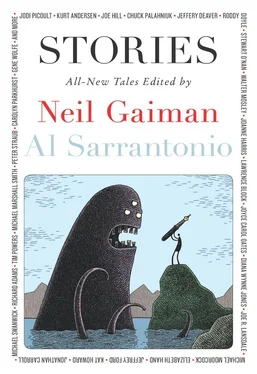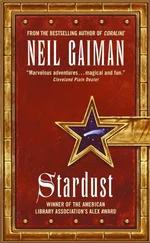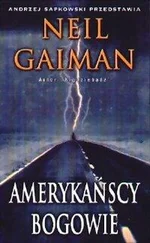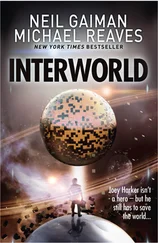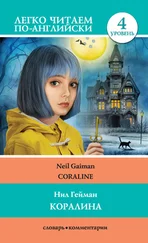Neil Gaiman - Stories - All-New Tales
Здесь есть возможность читать онлайн «Neil Gaiman - Stories - All-New Tales» весь текст электронной книги совершенно бесплатно (целиком полную версию без сокращений). В некоторых случаях можно слушать аудио, скачать через торрент в формате fb2 и присутствует краткое содержание. Жанр: Фантастика и фэнтези, на английском языке. Описание произведения, (предисловие) а так же отзывы посетителей доступны на портале библиотеки ЛибКат.
- Название:Stories: All-New Tales
- Автор:
- Жанр:
- Год:неизвестен
- ISBN:нет данных
- Рейтинг книги:3 / 5. Голосов: 1
-
Избранное:Добавить в избранное
- Отзывы:
-
Ваша оценка:
- 60
- 1
- 2
- 3
- 4
- 5
Stories: All-New Tales: краткое содержание, описание и аннотация
Предлагаем к чтению аннотацию, описание, краткое содержание или предисловие (зависит от того, что написал сам автор книги «Stories: All-New Tales»). Если вы не нашли необходимую информацию о книге — напишите в комментариях, мы постараемся отыскать её.
Stories: All-New Tales — читать онлайн бесплатно полную книгу (весь текст) целиком
Ниже представлен текст книги, разбитый по страницам. Система сохранения места последней прочитанной страницы, позволяет с удобством читать онлайн бесплатно книгу «Stories: All-New Tales», без необходимости каждый раз заново искать на чём Вы остановились. Поставьте закладку, и сможете в любой момент перейти на страницу, на которой закончили чтение.
Интервал:
Закладка:
In the affluent suburb of the great American city, on a residential street of large, expensive houses, the Waldman house, a clapboard colonial on a two-acre lot, began by degrees to fall into disrepair, decline. The front lawn was unmowed and spiky, moss grew on the rotting shingle boards of the roof and newspapers and flyers accumulated on the front walk. The mother, once a sociable woman, began to be embittered, suspicious of neighbors. The mother began to complain of ill health. Mysterious “hexes.” The mother understood that the father had divorced her as a way of divorcing himself from the misshapen broke-backed son with the teary yearning eyes who would never grow up, would never marry, would spend the rest of his life in the fevered execution of eccentric and worthless “art.”
Frequently the mother called the other son, the son of whom she was so proud, whom she adored. But Eddie seemed always to be traveling, and rarely returned his mother’s messages.
In time, within a decade, the mother would die. In the now derelict house (visited, infrequently, by a few concerned relatives) Edward would live as a recluse in two or three downstairs rooms, one of which he’d converted into a makeshift studio. The embittered mother had left him enough money to enable him to continue to live alone and to devote himself to his work; he hired help to come to the house from time to time to clean it, or to attempt to clean it; to shop for him, and to prepare meals. Freedom! Misery and wonder! On large canvases Edward transcribed his bizarre dream-images, among galaxies of hieroglyphic shapes in a sequence titled Fossil-Figures . For it was Edward’s belief, which had come to him in a paroxysm of spinal pain, that misery and wonder are interchangeable and that one must not predominate. In this way time passed in a fever heat for the afflicted brother, who was not afflicted but blessed. Time was a Möbius strip that looped back upon itself, weeks, months and years passed and yet the artist grew no older in his art. (In his physical being, perhaps. But Edward had turned all mirrors to the wall and had not the slightest curiosity about what Edward now “looked like.”)
The father, too, died. Or disappeared, which is the same thing.
Relatives ceased to visit, and may have died.
Into infinity, which is oblivion. But it is out of that infinity we have spring: why?
It began to be, as if overnight, the era of the Internet. No man need be a recluse now. However alone and cast off by the world.
Via the Internet E.W . communicated with companions-soul mates-scattered in cyberspace, of whom, at any given time, there were invariably a few-but E.W.’s needs were so minimal, his ambition for his art so modest, he required only a few-fascinated by the Fossil-Figures he displayed on the Web, who negotiated to buy them. (Sometimes, bidding against one another, for unexpectedly high sums.) And there were galleries interested in exhibiting the works of E.W . -as the artist called himself-and small presses interested in publishing them. In this way, in the waning years of the twentieth century, E.W. became something of an underground cult figure, rumored to be impoverished, or very wealthy; a crippled recluse living alone in a deteriorating old house, in a deteriorating body, or, perversely, a renowned public figure who guarded his privacy as an artist.
Alone yet never lonely. For is a twin lonely?
Not so long as his twin-self continues to exist.
The brothers were never in contact now, yet, on TV, by chance as sometimes Edward flicked through channels like one propelling himself through the chill of intergalactic space, he came upon images of his lost brother: giving impassioned speeches (“sanctity of life”-“pro-life”-“family values”-“patriotic Americans”) to adoring crowds, being interviewed, smiling into the camera with the fiery confidence of one ordained by God. There was the demon brother elected to the U.S. Congress from a district in a neighboring state the smaller brother hadn’t known he was living in; there, the demon brother beside an attractive young woman, gripping the young woman’s hand, a wife, a Mrs. Edgar Waldman, the smaller brother hadn’t known he had married. The demon brother had been taken up by rich, influential elders. In a political party, such elders look to youth to further their political heritage, their “tradition.” In this political party the “tradition” was identical with economic interests. This was the triumphant politics of the era. This was the era of the self. Me, me, me! There is me, me, me there is only me. Cameras panned rapturous audiences, fervently applauding audiences. For in me, there is the blind wish to perceive we . As in the most primitive, wrathful, and soulless of gods, humankind will perceive we . In the most distant galaxies, infinities of mere emptiness, the ancient yearning we .
So Edward, the left-behind brother, hunched in his wheelchair, regarded the demon brother glimpsed on TV with no bitterness nor even a sense of estrangement as one might feel for a being of another species but with the old, perverse yearning I am your brother, I am in you. Where else can there be, that I am?
HERE WAS THE INESCAPABLE fact: the brothers shared a single birthday. Even beyond their deaths, that fact would never change.
January 26. The dead of winter. Each year on that day the brothers thought of each other with such vividness, each might have imagined that the other was close beside him, or behind him, a breath on his cheek, a phantom embrace. He is alive, I can feel him Edward thought with a shiver of anticipation. He is alive, I can feel him Edgar thought with a shiver of revulsion.
THERE CAME A JANUARY 26 that marked the brothers’ fortieth birthday. And a few days later there came to an exhibit of E.W.’s new exhibit Fossil-Figures in a storefront gallery in the warehouse district near the Hudson River at West and Canal streets, New York City, U.S. Congressman Edgar Waldman, who’d given a political speech that afternoon in midtown, alone now, a limousine with U.S. federal plates waiting at the curb. Noting with satisfaction that the exhibit rooms were nearly deserted. Noting with disgust how the old, cracked linoleum stuck against the bottom of his expensive shoes. The handsome congressman wore very dark glasses, he looked at no one, in dread of being recognized in this sordid place. Especially he was in dread of seeing the crippled brother-“E.W”-whom he had not seen in nearly twenty years but believed that he would recognize immediately though by this time the twins-“fraternal twins”-looked nothing alike. Edgar anticipated the stunted broken figure in a wheelchair, yearning teary eyes and wistful smile that maddened, made you want to strike with your fists, that offer of forgiveness where forgiveness was not wanted. I am your brother, I am in you. Love me! But there was no one.
Only E.W.’s work, pretentiously called by the gallery “collage paintings.” These Fossil-Figures lacked all beauty, even the canvases upon which they were painted looked soiled and battered and the walls upon which they were (unevenly) hung were streaked as if the hammered-tin ceiling leaked rust. What were these artworks covered in dream/nightmare shapes, geometrical, yet humanoid, shifting into and out of one another like translucent guts, deeply offensive to the congressman who sensed “subterfuge”-“perversion”-“subversion” in such obscure art, and what was obscure was certain to be “soulless”-even “traitorous.” Most upsetting, the Fossil-Figures seemed to be taunting the viewer, anyway this viewer, like riddles, and he had no time for Goddamned riddles, the rich man’s daughter he’d married to advance his career was awaiting him at the St. Regis, this visit to West and Canal streets was an (unmarked) stop in Congressman Waldman’s itinerary for the day. Wiping his eyes to better see an artwork depicting the night sky, distant galaxies, and constellations, almost there was beauty here, suns like bursting egg yolks swallowing up smaller suns, comets shaped like-was it male sperm? — blazing male sperm? — colliding with luminous bluish-watery planets; and, protruding from the rough surface of the canvas, a thing so unexpected, so ugly, the congressman stepped back in astonishment: was it a nestlike growth of some kind? a tumor? composed of plasticine flesh and dark crinkly hairs and-could it be baby teeth? arranged in a smile? — and a scattering of baby bones?
Читать дальшеИнтервал:
Закладка:
Похожие книги на «Stories: All-New Tales»
Представляем Вашему вниманию похожие книги на «Stories: All-New Tales» списком для выбора. Мы отобрали схожую по названию и смыслу литературу в надежде предоставить читателям больше вариантов отыскать новые, интересные, ещё непрочитанные произведения.
Обсуждение, отзывы о книге «Stories: All-New Tales» и просто собственные мнения читателей. Оставьте ваши комментарии, напишите, что Вы думаете о произведении, его смысле или главных героях. Укажите что конкретно понравилось, а что нет, и почему Вы так считаете.
